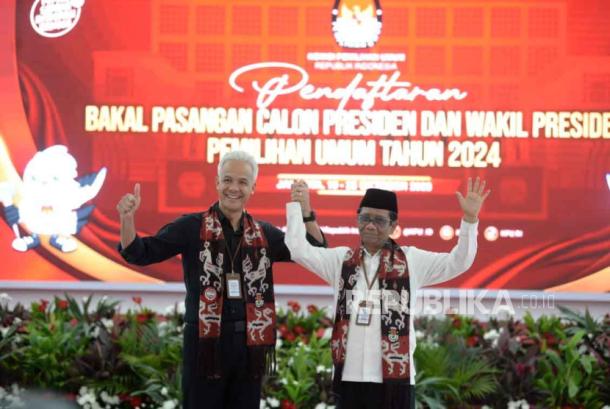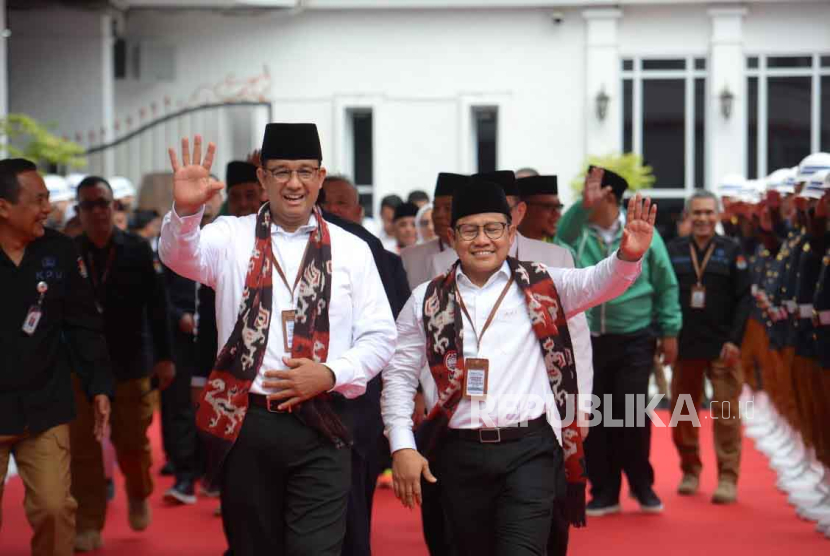REPUBLIKA.CO.ID, JAKARTA -- Candidates for next year Indonesia presidential election officially registered for the contestation, Thursday (19/10/2023). It marks the beginning of the long run which will culminate in the new Indonesia presidency since Joko Widodo two terms periodes is due.
The first to register is the presidential canditate Anies Baswedan and his vice presidential candidate Muhaimin Iskandar. Anies is a technocrat who previously served as the governor of Jakarta. His rising coincided with the strengthening of conservative Islamic sentiment in Indonesia. In the Jakarta gubernatorial election in 2017, he defeated Basuki Tjahaja Purnama who was criticized for allegedly insulting the Quran.
While Muhaimin, widely known as Cak Imin, is the chairman of National Awakening Party (PKB) which was founded as a political outlet for Nahdlatul Ulama, the largest Islamic mass organization in Indonesia, in the wake of Indonesian Reformation in 1998.
Even though two of the parties supporting Anies-Cak Imin, namely Nasdem and PKB, were supporters of Jokowi in the previous presidential election, the pair has recently positioned themselves as the antithesis of the current government.
The Nasdem Party has recently been tarnished by a number of corruption cases. Two of their ministers in Jokowi's cabinet are currently in prison and are undergoing trial in connection with corruption cases.
Anies and Cak Imin, as well as the elite of his leading party entered the registration room in the second floor hall of the KPU RI building around 10.00 local time. They were welcomed by the leaders of KPU RI.
The Anies-Imin (Amin) pair was carried by the Nasdem Party, which had 10.26 percent of the seats in Parliament, the PKB with 10.09 percent of the seats, and the Justice and Prosperity Party (PKS) with 8.7 percent of the seats. The three political parties combined have a total of 29.05 percent of the seats in Parliament, thus exceeding the presidential nomination threshold, which is 20 percent of the seats in Parliament.
“We want equality of opportunity, the opportunity to work, the opportunity to get a better future through education, and the opportunity for better health protection,” Anies said after the registration.
The second contender, Ganjar Pranowo and his vice presidential candidate Mahfud MD officially registered not long after Anies and Cak Imin. The duet was registered by a combination of four political parties.
The registration process took place around 13.00 pm in the second floor hall of the KPU RI Building. In addition to Ganjar and Mahfud, leaders of supporting political parties such as PDIP General Chairman Megawati Soekarnoputri, Acting PPP General Chairman Mardiono, Perindo General Chairman Hary Tanoesoedibjo, and Hanura Party General Chairman Oesman Sapta Odang were present.

Ganjar is a lifelong cadre of the PDIP, the incumbent rulling party. He previously served as the governor of Central Java. Like his party, Ganjar has nationalistic and secular tendencies. His party is said by one of the eilte as being leftist and is headed by Megawati who is the doughter of Sukarno, Indonesia's first president.
While Mahfud MD is currently the coordinating minister of politics, legal, and security affairs. He is from the island of Madura in the East Java, a status that is thought to bode well with the voters from the region. Mahfud has long experience in the field of law and state administration. He served as minister of law and human rights under President Abdurrahman Wahid, and also served as chairman of the Constitutional Court. Mahfud is also has a root in Nahdlatul Ulama.
The Ganjar Pranowo-Mahfud MD pair was carried by the PDIP which had 22.26 percent of the seats in Parliament and the Unity and Development Party (PPP) which had 3.3 percent of the seats. The two-party seat total is 25.56 percent so it has exceeded the presidential nomination threshold requirement of 20 percent of Parliament seats.
The pair were also carried by Perindo and the Hanura Party. Although they do not have seats in parliament, both parties have votes from previous elections that can serve as a basis for running for office.
Perindo won 2.67 percent of the vote in the 2019 general election, while Hanura got 1.54 percent of the vote. If summed up by the votes of PDIP and PPP, the four political parties combined got 28.06 percent of the votes in the 2019 election results. The number has also exceeded the threshold for presidential nomination based on votes, which is 25 percent of the votes cast in previous elections.
Ganjar himself explained that the 2024 presidential election is not about him and Mahfud. "This is not a story about power, but a story about the fate of the nation, the fate of the people. A story about our children who need protection and need access to good education," said Ganjar at the Proclamation Monument, Jakarta, Thursday (19/10/2023).
The 2024 presidential election, he said, is a place to fight for the fate of mothers, women and disabled groups. A place to fight for teachers, farmers, fishermen who want prosperity. "Ladies and gentlemen, of course if we look at the field of medical personnel, doctors, those in the far corners of Indonesia, how much they need our attention," said Ganjar.
His party actually has a chance to put that promise into reality in the nine years as the ruling party and the main endorser of the current Jokowi's administration. But statistically, nothing significantly changed in Indonesia since their win in 2014.
Beside the two couple, there is also another hopeful candidate, Prabowo Subianto from the Gerindra Party. He is currently serve as the minister of defense. Prabowo is a former army general from Soeharto's era.
The coalition of parties that support Prabowo is the largest of the three, namely Gerindra, Golkar, National Mandate Party (PAN), Demokrat Party, and the nonparliamentary Cresent and Star Party. The coalition is yet to decide who will join Prabowo as vice presidential candidate.
The contender is the Minister of State Owned Enterprise Erick Thohir; the mayor of Surakarta who is also President Jokowi's son Gibran Rakabuming, the former governor of West Java Ridwan Kamil, and the governor of East Java Khofifah Indarparawansa.


